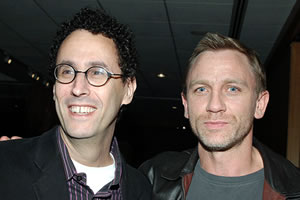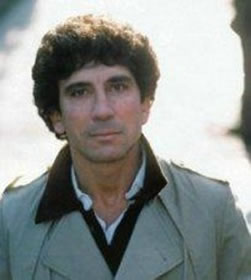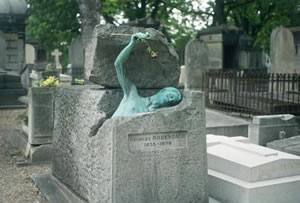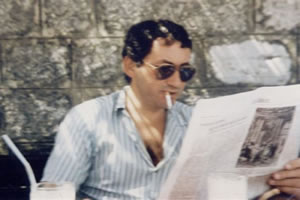De Amerikaanse schrijver Tony Kushner werd geboren op 16 juli 1956 in New York. Zie ook alle tags voor Tony Kushner op dit blog.
Uit: The Intelligent Homosexual’s Guide to Capitalism and Socialism with a Key to the Scriptures
“GUS
You are.But this… (A shrug.)Complicated, honey.
(Little pause.)
You remember, I think I told you this, the Daily News strike, I helped out, I was ILWU liaison with the teamsters, the paper and printing trades, when they went out against the Daily News? With the writers, the writers went out too, word and muscle, 1991? Same year the Committees of Correspondence broke from the party, same year I left, I left the party, later I rejoined but — 1991, the year pop died, and Gorbachev was, you know, that whole (gesture, something immense).The coup attempt in Moscow and Yeltsin and Gus Hall, that (another gesture, throwing away).
The first Iraq — all that crazy s— that year. Anyway. This old guy, this printer, who I met then on the pickets, we liked each other a lot, he was a smart man, he had a perspective, maybe not… (To Clio:) But a perspective.
CLIO
Yeah.
GUS
So a year after all that, I got a call that this old printer, the guy’s been felled by a heart attack, wham, in a hospital. I went to see him, eyes screwed shut, with a stupid tube down his throat, tape around his mouth to, to hold it, and I saw, I sat for a while, and I noticed his hands was going
(He shows how the printer’s hands were going.)
Like, I thought, what is it, is he, is this, like, piano practicing.
(Again with the hands. The gestures aren’t much like piano playing: the fingers are rapidly moving unseen objects up, down, sideways.)
Then I thought, oh I get what — it made me cry, I cried. I thought, his hands want to pull out that tube, dumb Irish, probably he’d let some c—sucking Priest –
(A quick gesture to Pill, placating and acknowledging; Pill lets him off the hook.)
GUS
Some creep got to him, talked him out of a living will, so… And here he was, a prisoner, in that bed. So his hands were going –
(The printer’s hands again:)
His grandson offered me a Kleenex box, and I said, I said look at his hands, he… Maybe you think he wants to get at that tube, or, or the power cord to that goddamn pump?His grandson says, no, that’s just muscle memory. He’s a typesetter, a compositor. His hands are still working, see? He’s still setting stories and headlines in lead type.
(Little pause.)
That’s what it was, the kid was right. But so was I: His hands were working. Homo laborans. Homo faber. Man the maker. Man the worker. That’s what hands do.
(A look at his hands, then:)
My friend the printer. They left him alone that night, and somehow he managed to pull out the breathing tube. He asphyxiated.
The work of your hands makes the world.
And while you still have the use of them, they can unmake the goddam world, just as well.“

Tony Kushner (New York, 16 juli 1956)
Hier met de acteur Daniel Craig (rechts)
De Cubaanse dichter en schrijver Reinaldo Arenas werd geboren op 16 juli 1943 in Holguin. Zie ook alle tags voor Reinaldo Arenas op dit blog.
Uit: The Color of Summer (Vertaald door Andrew Hurley)
„The action begins in Havana, and as the curtain rises Gertrudis Gómez de Avellaneda, who has been brought back to life on Fifo’s orders so that she will be able to take part in the festivities honoring Fifo’s fiftieth year in power, escapes in a little fishing boat and heads for Florida. Learning instantly about the escape, Fifo sends out orders for her arrest, but realizing almost in the same breath that an arrest would cause an international scandal, he orders the people of Cuba to stage an act of repudiation against the poetess, while secretly ordering his trained sharks and diligent midgets to do everything in their power to block her flight. The act of repudiation begins with the appearance of a group of eminent poets who are still on the Island, some of whom have been brought back to life especially for this event. The idea is that all these poets will be able to persuade Avellaneda not to leave the country. On Fifo’s orders, they will throw at the fleeing poetess large quantities of rotten eggs, which thousands of midgets have piled along the edge of the ocean. Meanwhile, although at first it isn’t clear where Avellaneda is headed (the part about “headed for Florida” was a taunt flung by Radio Aguado), the Cuban poets in exile, including some brought back to life for this event, decide to have a huge demonstration on the southernmost tip of the United States (i.e., Key West) in order to encourage Avellaneda and show their moral support for her. In addition to reciting a great number of poems dedicated to her, they shower her with candy bars, California apples, bonbons, and even fake pearls.
Avellaneda: (On the Malecón in Havana, throwing a small, frail boat into the water) Pearl of the ocean/Star of the West! Once glorious isle, now pain in the ass! I’ve had it up to here with you! Farewell! I mean, Adios! And a thousand times adios, for tell me, how is one supposed to put up with this mess? See these big ugly bags under my eyes? I haven’t slept for days, because this brilliant sky of yours, no longer does Night cover with her sable veil—and so I’m off! Don’t try to stop me! The ubiquitous mob has forced me to flee my native land. Adios, once happy homeland, beloved Eden where even Numero Uno, the head hoodlum, has to keep one eye on his behind. No more of this for me; I’ve made up my mind! (Plus—however far and wide I searched, however hard I tried I never found the man to make me bride.) Into the boat! Hope swells my ample breast! Florida awaits. Next stop—Key West!
She clambers into the dinghy and begins to row quickly away. Avellaneda is a heavyset woman swathed in a long black nineteenth-century gown and wearing an equally black veil that covers her face. Upon seeing this bizarre figure, all the sharks swim away, howling piteously. The midgets also recoil in fright, and then whirl around and head back toward the coast. Fifo has no choice but to trust that the act of repudiation, which he orders to begin at once, will work.“

Reinaldo Arenas (16 juli 1943 – 7 december 1990)
De Belgische dichter en schrijver Georges Rodenbach werd geboren in Doornik op 16 juli 1855. Zie ook alle tags voor Georges Rodenbach op dit blog.
La ville est morte, morte, irréparablement
La ville est morte, morte, irréparablement !
D’une lente anémie et d’un secret tourment,
Est morte jour à jour de l’ennui d’être seule…
Petite ville éteinte et de l’autre temps qui
Conserve on ne sait quoi de vierge et d’alangui
Et semble encor dormir tandis qu’on l’enlinceule ;
Car voici qu’à présent, pour embaumer sa mort,
Les canaux, pareils à des étoffes tramées
Dont les points d’or du gaz ont faufilé le bord,
Et le frêle tissu des flottantes fumées
S’enroulent en formant des bandelettes d’eau
Et de brouillard, autour de la pâle endormie
– Tel le cadavre emmaillotté d’une momie –
Et la lune à son front ajoute un clair bandeau !
Le miroir est l’amour, l’âme-soeur de la chambre
Le miroir est l’amour, l’âme-soeur de la chambre
Où tout d’elle : le lustre en fleur, les bahuts vieux,
La statuette au dos de bronze qui se cambre,
Se réfléchit en un hymen silencieux.
Car l’amour n’est-ce pas n’être plus seul et n’est-ce
Pas se doubler par un autre meilleur que soi ?
Or la chambre se double au fond du miroir coi
Avec un renouveau de songe et de jeunesse ;
Mais les choses pourtant entre le cadre d’or
Ont un air de souffrir de leur vie inactive ;
Le miroir qui les aime a borné leur essor
En un recul de vie exiguë et captive ;
Et l’amour absorbant et profond du miroir
Attriste d’infini la chambre, qui se doute
D’un désaccord entre eux aux approches du soir,
Sentant que le miroir ne la contient pas toute !

Georges Rodenbach (16 juli 1855 – 25 december 1898)
De dichter verrijst uit zijn graf opPère Lachaise, Parijs
De Engelse schrijfster en historica Anita Brookner werd geboren op 16 juli 1928 in Herne Hill, een voorstad van Londen. Zie ook alle tags voor Anita Brookner op dit blog.
Uit: Making Things Better
„Herz had a dream which, when he awoke into a night that was still black, left him excited and impressed. He dreamed that he had received a call from his cousin, Fanny Bauer, the love of his life. He was to take her to the cinema, she ordained. Eager to conform to her wishes, as he always had been, he shrugged on his coat, and within seconds was elsewhere, as was the norm in dreams of wish-fulfilment. Although it was a weekday afternoon the cinema was so crowded that they had to stand at the back of the auditorium. Fanny was as he had always known her and still remembered her: petulant, with the petulance of a spoilt pretty woman, demanding and discontented. Shortly after the beginning of the film she had clutched his arm and declared that she felt unwell. Again, without transition, they found themselves in the vast cafe that was part of the cinema complex. Fanny had recovered somewhat but looked uncharacteristically dishevelled, with a large camel-hair coat slung over her shoulders. He was conscious of retaining his eager smile, but felt discomfited. This feeling had something to do with the coat, which he recognized as his own, the coat he should have been wearing. He had no memory of having offered it to her. The coat, and Fanny’s malaise, remained closely associated in his mind. It was only when he understood that it was he who had been taken ill that the dream attained its peak of significance. Ailing, smiling, he had offered her his remaining health and strength, and she, not in the least grateful, had carelessly dispossessed him, not noticing that she had done so. This was so akin to their real life association that, if anything, his newly awakened self was conscious of its reality.“

Anita Brookner (Herne Hill, 16 juli 1928)
De Duitse schrijver en journalist Jörg Fauser werd geboren op 16 juli 1944 in Bad Schwalbach. Zie ook alle tags voor Jörg Fauser op dit blog.
Liebesgedicht
Als wir uns liebten.
liebten wir uns selbst nicht.
Als wir uns den Krieg erklärten,
gaben wir uns schon verloren.
Als wir geschlagen waren,
bemühten wir die Geschichte.
Als wir allein waren,
übertönten wir sie mit Musik.
Als wir uns trennten,
blieben wir am gleichen Ort.
So lagen wir uns bald wieder in den Armen
und nannten es ein Liebesgedicht,
aber kein Liebesgedicht erklärt uns
die Angst vor der Liebe,
und warum der Himmel so blau war,
als wir uns trafen.
und warum er immer noch blau sein wird,
wenn wir sterben werden,
du für dich,
ich für mich.
Zum Alex nach Mitternacht
Die Charles-Bronson-Imitation aus Knautschlack
brütet über einer Cola in der roten Sonne
überbelichteter Vorstadt-Träume; erledigte Rivalen,
klatschende Klöten, Kadaver am Galgen, letzter Showdown,
triefende Mösen, abslutes Finalei
in Technicolor.
Der blondgefärbte schwule Iraker mit den lila Denims
gibt es endgültig auf, Mick Jagger nachzuäffen,
Mann ohne Publikum, Publikum
ohne Mann.
Pass auf, dass du im Lokus nicht ausrutscht
und dir deinen
parfürmierten Schwanz brichst.
Dieses miese Loch, Bastard
eines desolaten Hippie-Sommers, sag den letzten
Taxifahrer gute Nacht, sweet Mary,
vor die Wahl gestellt zwischen deinen
abgekauten Titten und dem Nichts
wähle ich deine Titten.
Die Einsamkeit macht uns allefertig, sagt Klaus
und drückt Janis Joplin, Whisky und “Me and Bobby McGee”,
der Joker rattert, Maschinengewehr, Baader geschnappt,
chant d’amour et de la mort, so’n Mordsdusel,
der Apparat spuckt lauter Markstücke aus
und wir bestellen nochmal
ein Magengeschwür.
Alles was da hängt
ist Fleisch.

Jörg Fauser (16 juli 1944 – 17 juli 1987)
Zie voor nog meer schrijvers van de 16e juli ook mijn vorige blog van vandaag.
